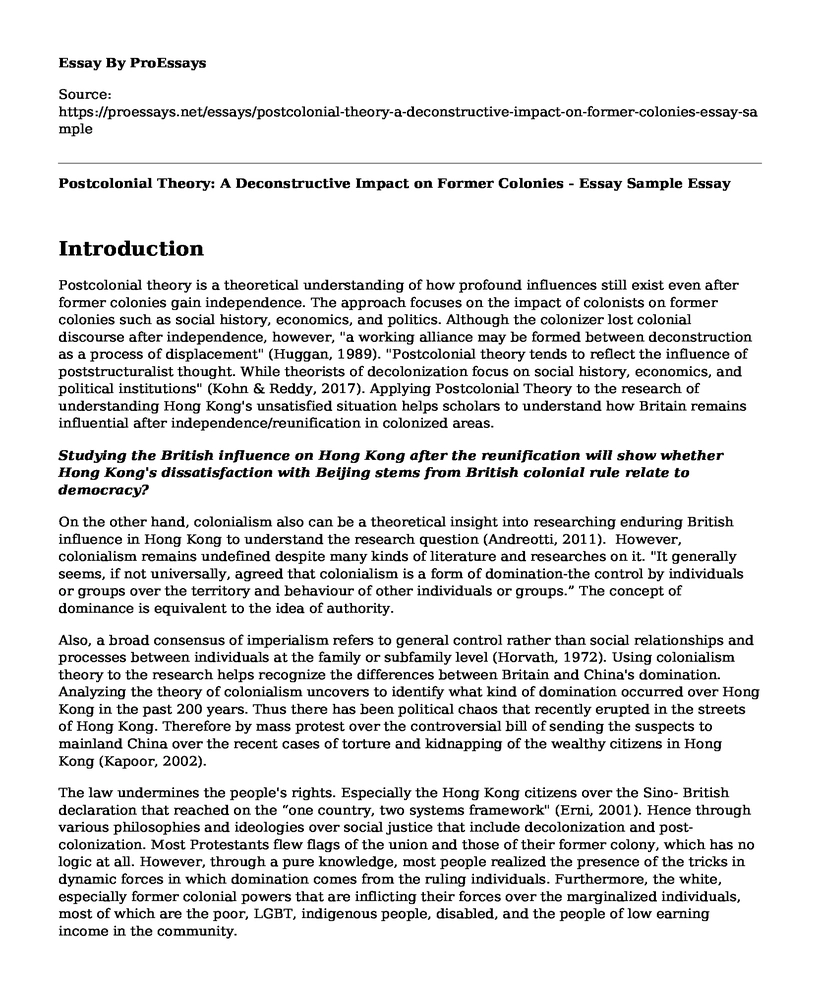Introduction
Postcolonial theory is a theoretical understanding of how profound influences still exist even after former colonies gain independence. The approach focuses on the impact of colonists on former colonies such as social history, economics, and politics. Although the colonizer lost colonial discourse after independence, however, "a working alliance may be formed between deconstruction as a process of displacement" (Huggan, 1989). "Postcolonial theory tends to reflect the influence of poststructuralist thought. While theorists of decolonization focus on social history, economics, and political institutions" (Kohn & Reddy, 2017). Applying Postcolonial Theory to the research of understanding Hong Kong's unsatisfied situation helps scholars to understand how Britain remains influential after independence/reunification in colonized areas.
Studying the British influence on Hong Kong after the reunification will show whether Hong Kong's dissatisfaction with Beijing stems from British colonial rule relate to democracy?
On the other hand, colonialism also can be a theoretical insight into researching enduring British influence in Hong Kong to understand the research question (Andreotti, 2011). However, colonialism remains undefined despite many kinds of literature and researches on it. "It generally seems, if not universally, agreed that colonialism is a form of domination-the control by individuals or groups over the territory and behaviour of other individuals or groups.” The concept of dominance is equivalent to the idea of authority.
Also, a broad consensus of imperialism refers to general control rather than social relationships and processes between individuals at the family or subfamily level (Horvath, 1972). Using colonialism theory to the research helps recognize the differences between Britain and China's domination. Analyzing the theory of colonialism uncovers to identify what kind of domination occurred over Hong Kong in the past 200 years. Thus there has been political chaos that recently erupted in the streets of Hong Kong. Therefore by mass protest over the controversial bill of sending the suspects to mainland China over the recent cases of torture and kidnapping of the wealthy citizens in Hong Kong (Kapoor, 2002).
The law undermines the people's rights. Especially the Hong Kong citizens over the Sino- British declaration that reached on the “one country, two systems framework" (Erni, 2001). Hence through various philosophies and ideologies over social justice that include decolonization and post-colonization. Most Protestants flew flags of the union and those of their former colony, which has no logic at all. However, through a pure knowledge, most people realized the presence of the tricks in dynamic forces in which domination comes from the ruling individuals. Furthermore, the white, especially former colonial powers that are inflicting their forces over the marginalized individuals, most of which are the poor, LGBT, indigenous people, disabled, and the people of low earning income in the community.
Therefore through considering these issues, there is a concept of "intersectionality." Which is the main reason that most of the people are against, particularly activists. Thus, the few people who are at the forefront of mistreating other people more so the Hong Kong people are equivalent to their former colonial powers. Hence, the main reason demonstrators flew the flags of their colonial powers was to undermine their freedom in the struggle for independence. They are therefore equalizing it with "pro-democracy" to "pro-colonialist," which enhanced the evil of china oppressing Hong Kong.
Reference
Andreotti, V. (2011). Actionable postcolonial theory in education. Springer.
Choy, H. Y. (2007). Schizophrenic Hong Kong: Postcolonial Identity Crisis in the Infernal Affairs Trilogy. Transtext (e) s Transcultures 跨文本跨文化. Journal of Global Cultural Studies, (3), 52-66, https://journals.openedition.org/transtexts/138.
Erni, J. N. (2001). Like a postcolonial culture: Hong Kong re-imagined. Cultural Studies, 15(3-4), 389-418, https://www.tandfonline.com/doi/pdf/10.1080/095023800110046632.
Horvath, R. (1972). A Definition of Colonialism. Current Anthropology.
Huggan, G. (2008). Decolonizing the Map: Postcolonialism, Poststructuralism, and the Cartographic Connection. Interdisciplinary Measures: Literature and the Future of Postcolonial Studies, 116-131.
Kapoor, I. (2002). Capitalism, culture, agency: dependency versus postcolonial theory. Third World Quarterly, 23(4), 647-664.
Kohn, M. & Reddy, K. (2017). Colonialism. The Stanford Encyclopedia of Philosophy. https://plato.stanford.edu.
Cite this page
Postcolonial Theory: A Deconstructive Impact on Former Colonies - Essay Sample. (2023, Apr 08). Retrieved from https://proessays.net/essays/postcolonial-theory-a-deconstructive-impact-on-former-colonies-essay-sample
If you are the original author of this essay and no longer wish to have it published on the ProEssays website, please click below to request its removal:
- How Social Movement, Women's Movement, and the Civil Rights Movement Affect Democracy
- Research Paper on Trump Administration Pay-to-Play Laws: Interest Groups' Remarkable Campaign
- Registered Nurses: Global Leaders in Health Care, Policymaking, and Nursing Care - Essay Sample
- Essay on Government Structure: 3 Branches of Power & Responsibility
- American Population Divided: Views on Drug Laws and Political Affiliations - Essay Sample
- Essay Example on Healthcare Risk Management: Maximizing Quality & Compliance
- Comparison and Contrast between the Federalists and the Anti-Federalists' Visions - Essay Sample







